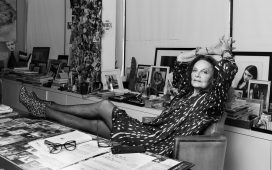Movies that rely on symbolism usually do so through conspicuous artifice, whether that of high style (Hitchcock, Hawks, Wes Anderson) or of rigorous reserve (Michelangelo Antonioni, Alain Resnais). But in “Naked Acts,” the first and (to date) only feature by Bridgett M. Davis, a complex symbolic dimension comes to the screen under the guise of modest realism. It is therefore all too easy to misunderstand this inventive low-budget independent film, which was completed in 1996; released only in New York, through Davis’s efforts; and is only now getting a wider release (in a new restoration). The story, set in the milieu of Black artists in New York, involves family drama and is centered on the making of an ultra-low-budget film. Yet it boldly embodies grand archetypes and underexplored legacies of Black cinema—and demonstrates a wider societal scope than do many movies with explicitly political themes.
Davis’s protagonist, Cicely (Jake-ann Jones), called Cece, is the twentysomething scion of a Black acting dynasty—the daughter of a former blaxploitation star named Lydia Love (Patricia DeArcy) and the granddaughter of a grande dame of the theatre (Maranantha Quick). Cece is long estranged from her mother, and the movie starts with her going to confront Lydia—who now runs a video store—about the traumas of her childhood. Davis draws past into present, rapidly delivering backstory both via flashback and via Cece’s voice-over. Cece has two more things to confront Lydia with, both of which may force her to consider her daughter in a new light. First, Cece is soon to take her place, belatedly, in the family tradition, making her début as an actress, in an independent film. Second, after a girlhood being often unhappy with her weight, she has lost more than fifty pounds. But, as Cece will discover, the unease and shame that she felt about her figure was fundamentally less to do with size or shape and more to do with her relation to power—with her anxiety regarding whether she or others are in control of her body.
These concerns become urgent for Cece because of the movie in which she is to appear, written and produced by an established playwright named Marcel (John McKie), and directed by a man, Joel (Ron Cephas Jones), who has directed plays of Marcel’s but never a movie. The film-within-the-film revolves around a Black male artist and his three Black female models. Cece is playing one of the three but is deeply uncomfortable with the script’s requirement that she model nude for the fictional artist. Instead of walking away, she tries to negotiate her way out of appearing naked onscreen without losing the part.
As both writer and director, Davis prioritizes the writing. In independent film, screenwriters often turn to directing as a way of safeguarding their scripts from the meddling of producers. This was certainly the case with many of Davis’s contemporaries, and this defensiveness could often make for dully literal, merely illustrative filmmaking. Davis’s approach is different. It’s not a case of just sticking to the script but thrusting rhetoric to the fore. The setting of “Naked Acts” is straightforwardly realistic, but Davis’s tone turns dialogue into emphatic declaration, and the conflicts of the drama into major clashes of ideas. Although the plot abounds with strife, both interpersonal and inner, Davis doesn’t sketch the individual psychologies in great detail; rather, she presents types, characters who are defined by a limited number of stark and strong traits, in a way that allows the force and the complexity of the film’s underlying themes to come through.
In effect, Davis’s film is a “Star Wars” or a “Superman” of closeup, firsthand drama, with characters of mythic dimensions. Davis draws upon her hard-edged, thick-lined characterizations to bring critical conflicts and violent power relations clearly into the foreground. Cece, in a flashback to her childhood, recalls a confrontation between her grandmother, who raised her while Lydia was busy acting, and Lydia. Her grandmother disdains her daughter’s titillating performances and her sexual freedom. For the elder woman, the dignity of art and of the artist are paramount, and she couches her moralistic attitudes in terms of the need to challenge racist assumptions with artistic “integrity.” For Lydia, the quest for respectability is as limiting as the prejudices that it’s meant to debunk, and, after this argument, she takes Cece back to live with her. In another of Cece’s flashbacks, Lydia goes off to give a performance and leaves her to be babysat by a boyfriend, Ronnie (Ajene Washington), who then sexually abuses her—something that, the movie seems to imply, happened only because she was wrenched away from her grandmother’s home.
The men in “Naked Acts” are a ceaselessly ignoble bunch. There’s Cece’s father, long vanished; Ronnie, a predator; Marcel, a martinet; Joel, a manipulator; and a random catcaller in the street, whom Cece sends scurrying away by turning her acting skills to practical use. Davis’s movie, taking place within the world of movies and image-making, shows the relentless pressure of male exploitation in terms of literal control of the representation of women’s bodies. Marcel, flaunting his power as both the producer and the writer of the film, leans hard on Joel and on his trio of actresses alike—not least, regarding the nudity that the movie demands.
Cece has her own ideas on the subject, but Joel, feckless in his professional and personal commitments alike, proves to be even more of an obstacle to their realization than Marcel is. Joel isn’t just Cece’s director but her boyfriend—and one with whom she has a long history, going back to her adolescence. The tension of who’s using whom, whether she is back together with him for the sake of a role or whether he gave her the part as a part of the romantic bargain, remains unresolved, but what’s shown unambiguously is the one-way flow of power from director to actor—and, even more, to actress. Joel, alone with Cece in his apartment, defends Marcel’s script as an accurate view of the essential relationship between the male artist and the female model: “He is the creator and she is the conduit.” She retorts, “Sort of like a director and his actresses?” (Joel adds, hedgingly, “It can be.”)
This is what’s at stake in “Naked Acts”: the politics of the body, the notion of the Black female body as an object of history and of power, still waiting for the chance to express women’s subjecthood. Davis does more than pose questions; with an advocate’s clear-eyed precision, she offers answers that emerge, in part, by way of a supporting character, a photographer named Diana (played by Renee Cox, a photographer in real life), who has been hired to shoot stills of the actresses in Marcel and Joel’s movie. In Diana’s studio, Cece looks askance at seminude photographs of Black women on the walls. Befriending Cece, Diana later encourages her to think about these photos in the light of a feminism that’s body-positive, nonjudgmental, and, above all, centered in collaboration and a shared power over representation. (In this regard, the principled and process-aware photographer is something of a directorial alter ego.)
“The camera knows when you’re faking it,” Diana declares, in conversation with Cece and another actress (Sandye Wilson). Cece responds with a joke of serious import: “That makes cameras a lot smarter than men, doesn’t it?” For Cece, the body is a bearer of trauma, a nexus of shame, a site of submission—and her experience in the independent film merely reproduces the pattern of subjection and domination. Through her friendship with Diana, Cece considers the practical power relations of image-making differently and, therefore, imagines her body otherwise. In “Naked Acts,” Davis presents a woman who, amid memories of neglect and abuse, struggles to find a creative middle ground between being ignored and being exploited. Thanks to Diana’s art and encouragement, Cece’s relationship with the camera takes on a revelatory life of its own, far removed from that of the movie in which she is appearing. Davis’s film, made at a time when there were few Black women filmmakers, exalts the hard-won breakthrough of self-depiction, of controlling the means of production; it opens pathways to a future cinema more radical than itself. ♦








